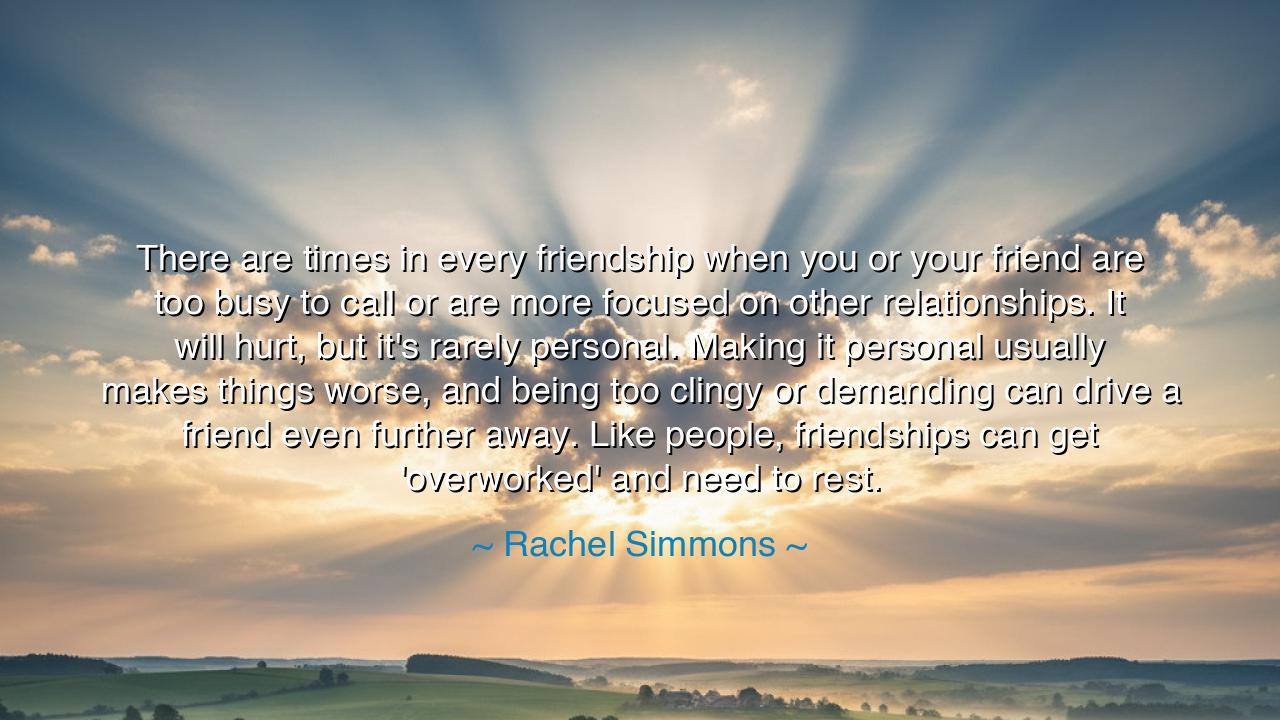
There are times in every friendship when you or your friend are
There are times in every friendship when you or your friend are too busy to call or are more focused on other relationships. It will hurt, but it's rarely personal. Making it personal usually makes things worse, and being too clingy or demanding can drive a friend even further away. Like people, friendships can get 'overworked' and need to rest.






The author and educator Rachel Simmons, whose work often explores the delicate architecture of human relationships, once wrote: “There are times in every friendship when you or your friend are too busy to call or are more focused on other relationships. It will hurt, but it's rarely personal. Making it personal usually makes things worse, and being too clingy or demanding can drive a friend even further away. Like people, friendships can get 'overworked' and need to rest.” In these words, there is the quiet wisdom of one who has observed not only the rise and fall of affection but also the natural rhythm of connection itself. Simmons speaks not as a philosopher of abstraction, but as a physician of the heart, diagnosing the hidden ailment of our age—the fear that every silence means abandonment.
The meaning of this quote rests in its acceptance of imperfection, its understanding that friendship, like all living things, must breathe to survive. Many believe that true companionship means constant closeness—that a friend must always be available, always responsive. But Simmons reminds us that even the deepest bonds must sometimes rest, as the fields do after harvest, or they will wither from exhaustion. Life pulls us in many directions—work, family, love, personal trials—and friendship, to endure, must bend with these tides rather than resist them. What she teaches is that absence need not mean loss, and that distance, if met with patience, often becomes a crucible for maturity and trust.
Her insight has ancient roots. In the wisdom traditions of the East, the Tao Te Ching teaches that "relationships, like water, flow best when they are not forced." The ancients knew that clinging breeds decay, and that love endures through spaciousness, not suffocation. Likewise, in Greek philosophy, Aristotle spoke of three kinds of friendship—those of utility, pleasure, and virtue. The highest, he said, was the friendship of virtue: one based not on constant exchange or entertainment, but on mutual respect and goodwill, even across time and distance. To demand constant presence from such a bond would be to misunderstand its nature. Simmons, in her modern voice, echoes this ancient truth—that friendship thrives in freedom.
There is a historical story that illuminates her point. Consider the friendship between John Adams and Thomas Jefferson, two giants of the American founding. Once brothers in cause, their bond was tested by politics and pride; they became estranged for years, each wounded by the other’s silence. Yet neither betrayal nor distance could truly sever their mutual regard. In old age, through letters, they found their way back—two aged minds reflecting on life, forgiveness, and the passage of time. Their friendship, like a river frozen in winter, thawed when the season changed. It had not died; it had merely rested. And when it returned, it flowed with greater depth and gentleness than before.
Simmons’s words also carry an emotional wisdom for our time of constant connection. In an age where messages can cross oceans in a second, we have grown impatient with stillness. The pause between texts, the day without a reply—these now spark insecurity and fear. But friendship is not measured by immediacy; it is measured by endurance. To make distance personal, as Simmons warns, is to plant seeds of resentment where patience should grow. To be clingy or demanding is not love—it is fear disguised as devotion. And fear, when left unchecked, corrodes even the strongest bonds.
True friendship, Simmons implies, requires faith—the faith that affection does not vanish in silence, that love can exist even when unseen. When a bond is real, it does not collapse under time or neglect; it renews itself when the moment is right. To let a friendship rest is not to abandon it, but to trust its resilience. As gardens need winter to bloom again in spring, so friendships need quiet seasons where both souls can tend their own roots. Those who cannot accept this rhythm will never know the depth of lasting companionship—they will only chase its shadow.
The lesson for all who hear these words is both gentle and firm: love your friends with freedom. Do not grip them so tightly that they cannot breathe. When they retreat into their own lives, wish them well and wait with grace. Trust that the friendship, if true, will return, renewed and strengthened. And when it does, welcome it not with reproach but with joy, for it has weathered the test of time. Learn to honor both the closeness and the distance, the laughter and the silence, for these are the seasons of friendship, each with its own purpose.
So let Rachel Simmons’s words be remembered as a timeless teaching: that friendship, like life itself, is cyclical—ebbing and flowing, contracting and expanding. When the bond feels strained, do not despair; let it rest. When it feels distant, do not clutch; let it breathe. For what is real will always find its way back, and what cannot endure rest was never meant to last. In patience, we honor the truth that friendship is not possession but presence, not constant closeness, but eternal understanding.






AAdministratorAdministrator
Welcome, honored guests. Please leave a comment, we will respond soon